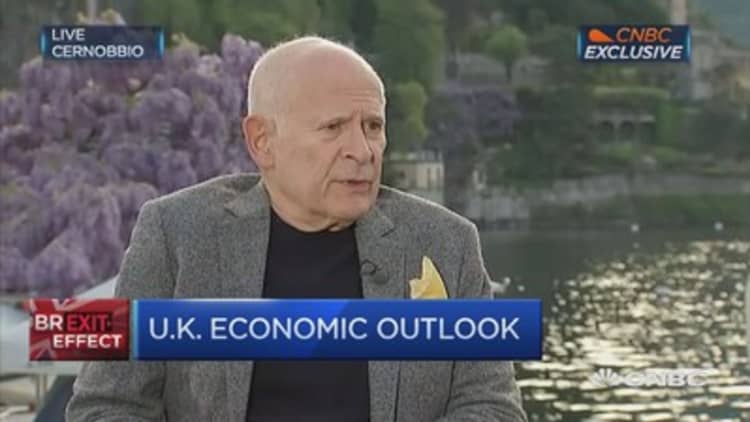
The U.K. and the rest of the European Union may want to come out of the Brexit negotiations on a positive note, but one leading London-based professor tells CNBC this may not be the case.
"Everybody wants win-win, everybody wants for (us to) all be better off. It's not going to be that way," Richard Portes, professor of economics at London Business School, told CNBC Friday.
"We're all going to be – both on the U.K. side and the EU-27 side – we're all going to be worse off. There's no way that you can avoid the shocks, the negative shocks that will come from breaking the past trade, investment and so forth relationships that we've had."
It's been just over a week since the U.K. triggered Article 50 and in the run-up to – and following the – triggering of formal exit talks, leading figures from both the U.K. and EU have stated that they want to keep close ties, with Eurogroup Chief Jeroen Dijsselbloem saying in Berlin Thursday, that both the U.K. and the rest of the EU should try to "minimize the damage" of Brexit, with him also highlighting the risks facing financial stability, Reuters reported.
On the sidelines of the Ambrosetti Finance Workshop in Italy, Portes discussed the economic outlook for Europe and the U.K., telling CNBC that while the euro area's economy has been picking up, troubles are expected ahead for the British economy.
"The outlook, interestingly, for the euro area economy has been picking up very substantially over the past half a year and that's partly to do with the European Central Bank's aggressive easing policies."
When it comes to the U.K., however, Portes believed the Bank of England would be facing its own set of challenges as the end of 2017 approaches.
"I think the Bank is going to be facing a hard choice towards the end of this year, because I think that consumer expenditure will be slowing down, investment will not be picking up and inflation will be picking up."
"So the bank will have the classic conflict between 'do we raise rates to combat inflation?' with the possibility that in fact that the economy is slowing down significantly."

U.K. data has yet to show drastic negative impacts from Brexit on the economy, however, analysts expect this tide to turn in the future.
In a recent UBS survey of 2,000 respondents, the results showed a "dramatic reduction in consumer discretionary income and intention to spend", with the biggest drop in sentiment related to clothing. UBS added that while consumer confidence had remained steady so far, they expected that with real wages set to fall, discretionary spend would follow.
A Panmure Gordon note on Thursday echoed similar sentiment, stating that while Brexit woes have "failed to upstage the UK economy" yet, the "economy cannot defy gravity in perpetuity."
"I think there are very few positive signs. We've got a consumer sustained boom and that's partly consumer credit," Portes said.
"Consumer credit has been rising at over 10 percent per annum – that is not sustainable and it's not good. It's re-leveraging when we thought that the economy – and in particular the household sector – had to deleverage."
Whether it's the U.K.'s economic outlook, future trading ties or overall relations between European countries and Britain, for Portes, the Brexit journey will have some form of negative impact on the region going forward.
"The U.K., and the euro zone, and the rest of the EU-27 will be negatively affected by the process of Brexit, there's no avoiding that," Portes concluded.

